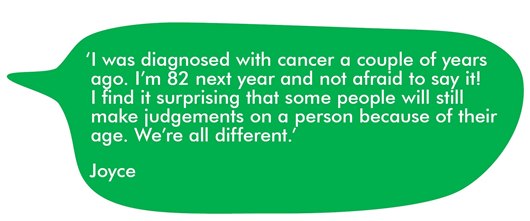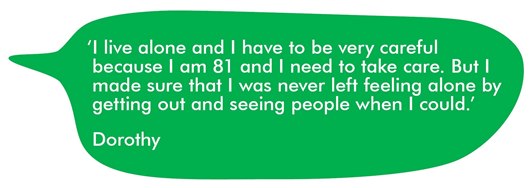Yesterday was the United Nations International Day of Older Persons. This year’s theme was the talents, contributions and participation of older people in society. In this blog, written by editor Maya, we celebrate the role of older people in society. We also highlight the problems that may affect people as they age, including older people living with cancer.
Older people in the UK
Is age just a number? For many people, it’s true that you are as old as you feel, and often people are living and working for longer than their parents or grandparents did. In 2017, around 18% of people in the UK are aged 65 or over. The number of people aged 85 and over is growing. Older people are often active in society and have much to contribute.
As we celebrate older people in society, it is also important to think about problems that may affect people as they age. These include health. For example, nearly two-thirds of people diagnosed with cancer in the UK are over 65. Because people are living longer, this means that there are also more older people who are living with cancer.

Cancer and older people – did you know?
What you can do
Are you an older person with cancer? Or do you know someone who is older and has cancer? Are you worried about cancer symptoms, for you or someone you know? These tips may help:
Be aware of possible cancer symptoms – We have information about signs and symptoms to look out for. It is important to check for changes in your health. Common symptoms can include:
See your doctor – If you have these or other symptoms, or you are worried about your health for any reason, talk to your GP.
Know your rights – Find out more about your rights as an older person with cancer. Whatever your age, you should receive the medical treatment, care and support that is right for you.
Understand your cancer treatment – If you have questions about your cancer treatment, ask your healthcare team. You can write a list of questions to ask at your appointment and also take a friend or relative with you.
Have a healthy lifestyle – We have lots of ideas for keeping as healthy as possible, whatever your age.
Get the support you need – Your family and friends may be able to offer practical and emotional support, including help with shopping, hospital visits or a chat over a cup of tea. You can also ask your GP or hospital team about help that may be available to you locally.
If you have questions, or just need to talk, our cancer support specialists can help. If you want to share your experiences, you can also visit our Online Community or find a support group in your area.

To see what else Macmillan's cancer information team has been blogging about, please visit our blog home page! You can subscribe to receive our blogs by email or RSS too.
We're with you every step of the way
The Macmillan team is here to help. Our cancer support specialists can answer your questions, offer support, or simply listen if you need a chat. Call us free on 0808 808 00 00.
Comments? Feel free to add them below (you need to be logged in).
Keep in touch Follow Macmillan’s cancer information team on Twitter @mac_cancerinfo
Whatever cancer throws your way, we’re right there with you.
We’re here to provide physical, financial and emotional support.
© Macmillan Cancer Support 2026 © Macmillan Cancer Support, registered charity in England and Wales (261017), Scotland (SC039907) and the Isle of Man (604). Also operating in Northern Ireland. A company limited by guarantee, registered in England and Wales company number 2400969. Isle of Man company number 4694F. Registered office: 3rd Floor, Bronze Building, The Forge, 105 Sumner Street, London, SE1 9HZ. VAT no: 668265007